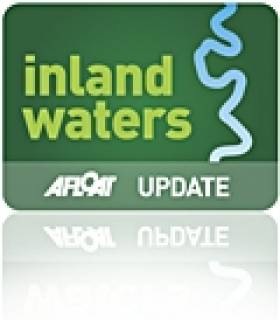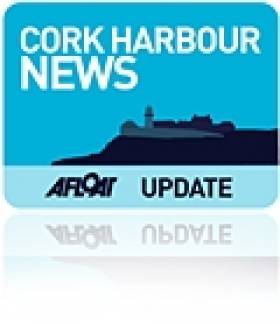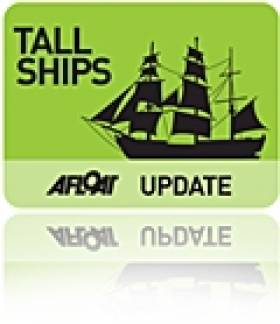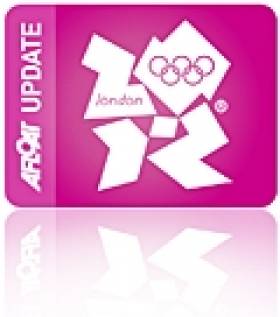Displaying items by tag: City
Ilen Project 'CityOne' Dinghies for Culture Night, Limerick City
#cityone – The Ilen School's new sailing boat CityOne will be on exhibition for Culture Night in Limerick City, Friday September 19th. A fleet of four CityOnes will be on view from 6pm to 9pm on Howley's Quay.
Culture Night, an annual all-island public event which celebrates culture, creativity and the arts, is a wonderful platform from which to exhibit the boats, whose dynamic graphics are the four selected designs from a very sucessful CityOne International Graphic Arts Competition. The boats have recently been designed and built in the Ilen School, Limerick City, as part of City of Culture celebrations.
The CityOnes will race the following day, September 20th from 1.30pm Saturday at Howleys Quay, Limerick City.
100 Boats Expected for Saturday's Cobh to Blackrock Yacht Race
This historic race – sponsored by the Port of Cork – will again feature strongly as one of the biggest events supporting this years Cork Harbour Open Day
Starting at midday off Cobh Promenade the race will continue along its traditional route passing Ringaskiddy, Monkstown, Passage, across Loch Mahon and along to the finish at Blackrock Castle.
All boats are then invited to continue up to the City Quays where complimentary berthing will be provided by the Port of Cork at the Cork City Marina.
A barbecue and usual refreshments will be available at the Boardwalk Restaurant (just opposite the City Pontoon) along Lapps Quay. The prize-giving will take place during the afternoon at the Boardwalk. Crews, their families and friends will have plenty of time to relax and enjoy themselves as we wind up the CSC laptop (and operators) to collate the dozens of times across all manner of classes in to a meaningful set of results.
The club would appreciate it if competitors would come along to support the after race festivities and prize-giving, especially if you think you may have won something. As always, the race is free to enter and a collection will be held for the RNLI during the afternoon.
City Powerboat School on the Market
Due to an opportunity for its owners overseas Dublin City's only powerboat training school, City Powerboat School is on the market. The Irish Sailing Association recognised training establishment is advertised in next week's edition of Afloat magazine. The school operates in the 'highly visible' River Liffey area. School principal Felix Finlay says 'the position of the school in Dublin City has attracted many enquiries, for not only powerboat training courses, but sail training, tourism activities, and educational opportunities'. More here.
Dublin to Welcome Tall Ships into the Bay in August 2012
For the first time since 1998, Dublin City will welcome back sailing's International Tall Ships Races, presented by Szczecin, Poland. As final host port for the 2012 Tall Ship Races, the event will see up to 100 Tall Ships sail into Dublin for a four day Festival and celebration, from Thursday the 23rd August to Sunday 26th August, 2012. Ships from as far away as Chile, Mexico, Argentina, USA and European and Baltic countries including Italy and Norway will chart their course to Dublin.
Over 5000 participants will compete in these "experience of a lifetime" races and there will be opportunities for young trainees from Dublin to be selected to participate in the races. The event offers young people a unique setting for developing essential life skills like team building, leadership, multi-cultural understanding and friendship with participants from up to 50 countries taking part.
The Lord Mayor said, "The visit of the Tall Ships to Dublin will be the biggest event in Ireland in 2012. It will provide a major boost to all city businesses and will enhance Dublin's position as a major International event destination. It should be great fun for everyone, young and old".
The next 18 months will see opportunities for businesses to get involved in sponsorship of the event such as the Trainee Recruitment Programme. These magnificent ships will also take bookings for corporate hospitality and it is expected that 1.5 million visitors from home and abroad will attend a full programme of activity and entertainment for all ages during the festival.
Commenting at the launch of the Tall Ships 2012, Mr. Enda Connellan, Chair of the Tall Ships Steering Group said, "When Dublin last hosted the Tall Ships Races in 1998 it reminded us all of the rich history and close associations between the port and the city that has grown up around it. When the Tall Ships return in August next year they will be greeted by a significantly altered skyline that now includes the Samuel Beckett Bridge, Dublin Convention Centre, the Spire, the Grand Canal Theatre and the O2. One million citizens visited the Tall Ships festival then and I have no doubt that many more will experience the carnival atmosphere when these magnificent sailing ships return to Dublin in 2012"
The races in 2012 will visit the ports of St. Malo in France, Lisbon in Portugal, Cadiz and La Coruna in Spain, from where they will set sail on the last leg of their races to their final host port, Dublin.
Eamonn O'Reilly, CEO of Dublin Port Company that manages Dublin Port said, "I am delighted to welcome the Tall Ships Races to Dublin Port, Ireland's premier port. The Port handles 50% of all Ireland's imports and exports, making it a significant facilitator of Ireland's economy. In addition it welcomes 1.7 million tourists through the ferry companies operating there and 2010 saw an additional 130,000 tourists and crew from the 85 cruise ship calls to the Port "
Looking for further reading on Tall Ships in Ireland? Click the links below:
Click this link to read all our Tall Ships Stories on one handy page
Previewing Ireland's Tall Ships 2011 Season
Can Ireland Get a New Tall Ship?
Superyacht Fleet Expected to Visit London Olympics then Ireland
London is expected to provide a great SuperYacht venue for the Olympics and the hope is that some of the massive visitors may in turn continue cruising in Ireland according to www.YachtsLondon.com who are providing services to help yachts arrange to visit in 2012.
There are only a handful of capital cities that can accommodate SuperYachts in their hearts and London is one of these with its iconic river views of Tower Bridge, Greenwich, the O2 Dome and the Canary Wharf financial district.
A legacy of London's place at the centre of world trade in the past are its remaining docks which will provide high quality stern-to mooring for 50-100 large yachts as demand warrants. Canary Wharf will be the centre of this with added space in the Royal Docks next to City Airport. Yachts up to 200m LOA and 30m beam can be accommodated.
Hugh Agnew, one of the principals of YachtsLondon said that "many parties will be involved including dock owners, landowners, pier operators, PLA, MCA, security and suppliers. We can help with all of these, but the key at the moment is early decisions so that sufficient dock space is put in place for 2012."
As well as the Olympic Games there are many other events in the UK in 2012 including Superyacht Cup, J Class regattas, Westward Cup so if there was ever a year to plan to make UK the destination then 2012 will be it with the possibility to link to cruising in Ireland, Scotland and Scandinavia.


































































